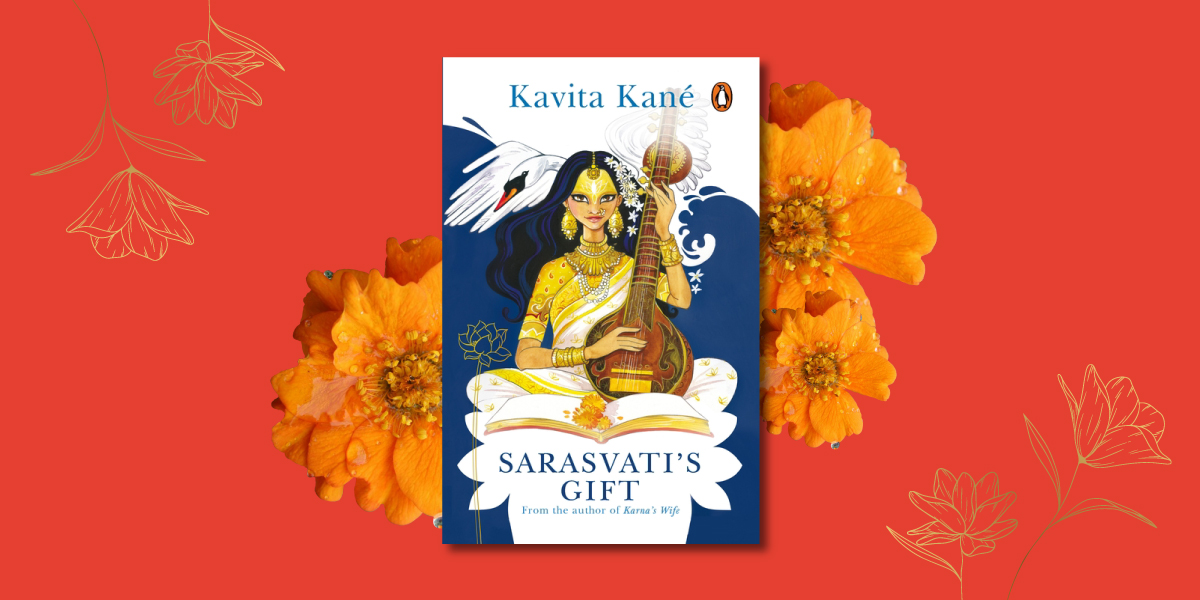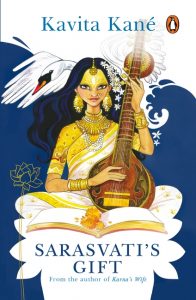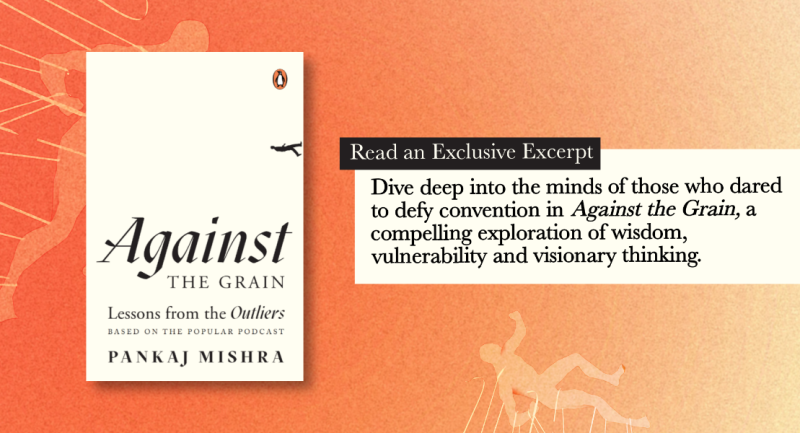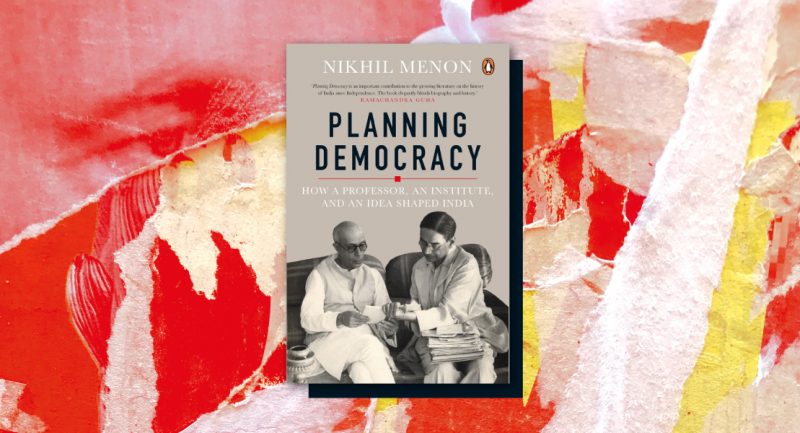
Sarasvati is the feminine force worshipped as the goddess of learning, yet we barely know much about this goddess. In Sarasvati’s Gift, Kavita Kané brings to light Sarasvati’s story. The goddess of art, music and knowledge – told in the voices of nameless celestials, powerful gods and lesser mortals. Through the passage below, you can get a glimpse of an extraordinary woman and her remarkable life.
~

Sarasvati’s Gift
Kavita Kane
Brahmalok looked warmer in the daylight. The mist had thinned, and from her palace window, Sarasvati could glimpse the five peaks of the golden Mount Meru on whose summit lay the vast city of Brahmalok, encircled by a river, the Akash Ganga.
Her palace stood halfway down a steep hill and from her window, she could glimpse a narrow strip of the sea below and, opposite, the city of Brahmalok.
Sarasvati had not ventured outside the palace yet, but she intended to scour the capital city as well as the other eight cities that surrounded it. One was supposed to be of Indra, and the other seven of the other devas like Surya, Chandra and Agni.
Perhaps they were more populated than Brahmalok: this city was unusually isolated, she frowned as she absently strung at the veena, thoughtfully placed in her chamber. In a vague way, she realized that this was all for her benefit. Even the lake outside her window turned obligingly to a deep wine colour in the evenings, with the ivory swans loitering delightfully at her windowsill. It was a privileged paradise, this white little palace on the water, surrounded by woods in which she was free to do what she liked because . . . she was Sarasvati.
She was surrounded by beautiful things that breathed of taste and refinement. If you live in an atmosphere of luxury, luxury is yours whether it is yours or another’s, Sarasvati decided. She would rather treat it like an educational institution.
Likewise, since the past week, the palace had kept her busy: it was well-stocked with enough books for her to stay put. She had barely browsed through half of the enormous library downstairs, and she was yet to explore the music room. Brahma was as generous as he was thoughtful; she pursed her lips, pondering.
Brahma. He was a strange person; a person of few words, and almost no presence. She had met him a few times since that first day and from what she could gather, he seemed to be a loner, or rather an intellectual hermit, always deep in work and thought. Everyone revered him, with less fear and more awe. He mixed very rarely, very little with people. In the mornings, she occasionally spotted him in the distance, strolling by the seashore, lost in his thoughts and then retiring to his palace for the day, often disappearing for weeks. He was seldom invited anywhere, as people found him daunting. Besides, he seldom accepted the invitation.
Just as she did; she preferred her own company. She vaguely strung the instrument again. She had to do something, she sighed.
‘Look up,’ she heard a voice command her. She turned around with a start to see Brahma standing at the doorway.
He walked in slowly, his gait guarded and careful. ‘When you play music, always look up,’ he said to her, pointing to the sky with his long, muscled arm. ‘Look up at the sky! Even the tiniest stars are all worlds! And you are creating an entire new world yourself with the music you make—how significant you are compared to the universe!’
She was surprised to hear the vehemence in his voice, so dissimilar to his otherwise stony demeanour.
‘A modest speck!’ She beamed her brilliant smile, gesturing with a wide wave of her hands. ‘This palace is a trove, a museum of sorts, and I haven’t gone through even half of it.’
‘As is Brahmalok,’ he remarked, his lips pursed thin. ‘You will take some time to get used to it. It’s not very . . . lively, more on the quieter side. Because it is a planet composed entirely of Brahman—the highest thought.’
Sarasvati gave a knowing nod. ‘The land of the abstract Supreme Soul, greater even than Svarga, or Heaven: sated with eternity, knowledge and bliss.’
As always, her words pleased him more than he thought could affect him. Brahma watched her as she gracefully stood up to greet him, her hair delectably tousled, flowing free down her shoulders, below her waist, her sari creased as she attempted to smoothen the wrinkles at the waist. Yet she looked heavenly.
And as he looked at her, he felt a thickness in his throat.
‘There is no hurry, you can take all your time to study, to explore,’ he said unevenly, his tone slipping to slight hesitancy.
He cleared his throat, his face an expressionless mask again.
‘Er, I would not have interrupted you from your pursuits but for a reason. A certain urgency . . .’ he faltered. ‘I come here today, asking for a favour . . .’
‘Favour?’ she frowned, tilting her head sideways, appraising him with her steady stare. He flushed, feeling the heat climbing up his neck.
‘Am I supposed to run some errand?’ she asked bluntly.
Some could term her forthrightness rude, but he found it strangely exhilarating. He looked at her, hoping he was not staring. He saw her face turned at an angle and at the same time he was again struck by that strange thing about her which excited him. He swallowed convulsively, the thickness tight in his throat. She was oddly disconcerting.
He struggled. ‘I created you as a woman so as to aid me in my work of creation. Shatarupa, a female deity in many forms . . .’ he said, not moving a muscle except to speak.
She widened her eyes. ‘Am I supposed to be her?’
She had this charming way of framing her views as a question, as opinionated as herself. Brahma found himself relaxing in such talks, enthralling his mind and his heart.
He raised his brows again and nodded.
His brows seem more vocal than his words, she thought irreverently.
His baritone had gone husky. ‘Like your presence, your origin holds great importance in the balance and creation of the world. After creating the universe, I checked what was made and realized it was utterly lacking in concept. To help me with this monumental task of creating a form, I created you to help me out . . .’









